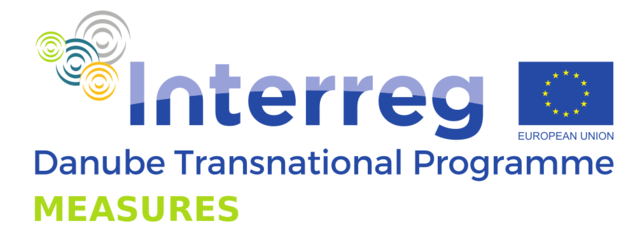MEASURES
Project title: "MEASURES: Managing and restoring aquatic EcologicAl corridors for migratory fiSh species in the danUbe RivEr baSin".
Funding: INTERREG Danube Transnational Programme
Duration: 01.06.2018 - 31.05.2021.
Sturgeons and other migratory fish species represent a historic, economic and natural heritage of the Danube River Basin and are indicators of the ecological status of aquatic ecosystems, especially of the functionality of ecological corridors. Their populations have suffered substantially from overfishing, pollution, habitat destruction and disruption of their migration routes. Habitat fragmentation, as well as the lack of comprehensive knowledge on available habitats for migratory fish and on genetic diversity impede the restoration of migration corridors, vital to secure migratory fish on the long run.
MEASURES will pave the way for the establishment of ecological corridors through identifying key habitats and initiating protective measures along the Danube and its main tributaries. A methodology for migratory fish habitat mapping will be developed and tested. A harmonized strategy (including prioritization) for the restoration of ecological corridors will be developed and will support implementation in future management plans. Two pilot actions are envisaged: (1) identify and map key habitats, (2) restocking of two native species to conserve their genetic pool. To achieve the main objectives as well as proper long-term and intersectoral stakeholder involvement, a variety of tools, strategies and pilot actions will be developed and promoted.
MEASURES brings a clear transnational additional value to the Danube Region, as it addresses key objectives of the EUSDR, of the RBMP and targets to align several legal frameworks and EU targets such as the WFD, FD, FFHD and biodiversity targets of the EU by compiling new knowledge and providing guidelines for the transnational management of key habitats of migratory fish to achieve an efficient conservation and re-establishment of these ecological corridors.
The project is composed of six work packages and IBER-BAS is involved in four of them as follows:
MEASURES brings a clear transnational additional value to the Danube Region, as it addresses key objectives of the EUSDR, of the RBMP and targets to align several legal frameworks and EU targets such as the WFD, FD, FFHD and biodiversity targets of the EU by compiling new knowledge and providing guidelines for the transnational management of key habitats of migratory fish to achieve an efficient conservation and re-establishment of these ecological corridors.
The project is composed of six work packages and IBER-BAS is involved in four of them as follows:
- WP1 Project Management: IBER-BAS will contribute to the project management as a Project Partner (ERDF PP 7) according the Project Management Document with Action Plan included in a Project Handbook established in the beginning of the project. Coordinator of the project from IBER-BAS is Assoc. Prof. Dr. Luchezar Pehlivanov, head of the Department of Aquatic Ecology.
- WP2 Communication activities: IBER-BAS will participate in preparation of internal communication plan and an external communication strategy and will provide content and feedback for the communication materials and will provide required content for the website during all project phases, on achievements and results of the project. IBER-BAS together with all other partners will distribute the printed and digital materials develop by WP2 and will ensure the translation and printing of communication materials in Bulgarian language if needed for the workshops that will be organized within the WPs.
- WP3 Infosystem eco-corridors: WP3 aims to (1) establish a MEASURES Information System (MIS) including all relevant information on ecological corridors for the conservation of long- and medium-distance migratory fish of the DRB and (2) to enhance capacity at national and transnational level by integrating water management and nature conservation and by strengthening the support for the conservation of migratory fish by improving ecological corridors.
The experts of IBER together with the other partners will collect and then select relevant information for Bulgarian Danube section and feed it into the MIS (e.g. monitoring data on migratory fish from water management units, literature, studies, scientific articles, books, project data, data from the River Basin Management Plans, etc.). Parts of this information will be translated to English and Bulgarian to facilitate a wider public access and to provide a common basis for transnational management activities. IBER is responsible for the organization of three workshops with the major groups of Bulgarian stakeholders.
- WP5 Strengthen migratory fish: The objective is to save, revive and strengthen migratory fish populations by the introduction of sciencebased conservation stocking (ex-situ). Targets are two flagship sturgeon species, the potamodromous Sterlet (Acipenser ruthenus) in the Hungarian Middle Danube and the anadromous Russian sturgeon (Acipenser gueldenstaedtii) in the Romanian Lower Danube. IBER-BAS together with other partners will conduct a comprehensive literature study. Beside IBER-BAS will organize transportation and incubation of fertilzed eggs and growing of fry of Russian sturgeon in Isaccea Monitoring Station and with the support of DDNI will conduct a river survey on Lower Danube Region to evaluate the results of restocking activity.
Expected benefits for IBER-BAS:
- enhance the capacity for scientific and conservation activities concerning sturgeons and the Danube river as a whole through transnational cooperation, data exchange, creating data base and networking;
- obtaining new knowledge;
- development of interrelations with national and local authorities and local stakeholders with regard to raising the support for field and other activities focused on sturgeon revival.
Budget in Euro:
Overall: 2512931,08; ERDF Contribution: 2045645,09; IPA Contribution: 90346,27
For more information:
Overall: 2512931,08; ERDF Contribution: 2045645,09; IPA Contribution: 90346,27
For more information:
- Poster
- Flyer

